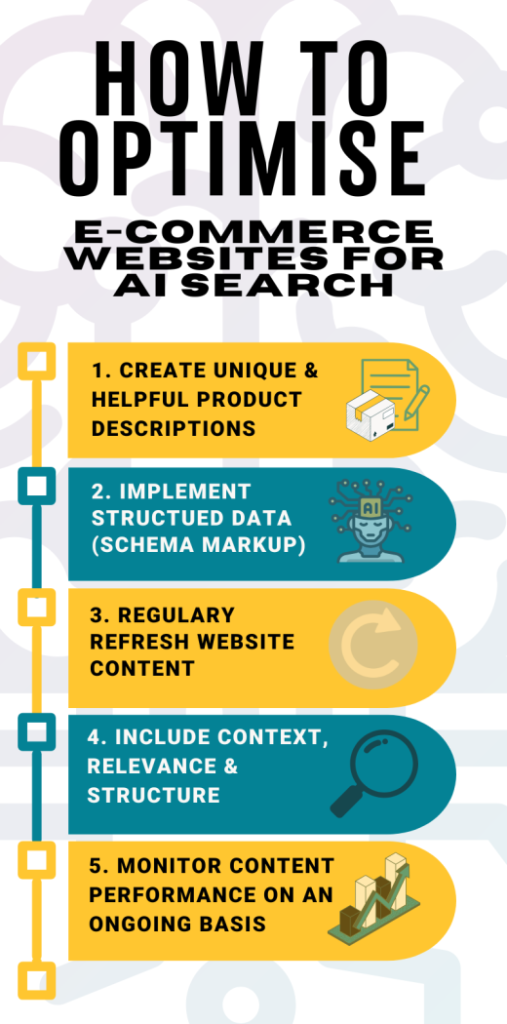Why optimise content for AI search?
Increased online visibility
Better user experience
Stay ahead of the competition
competitors are overlooking optimising their content for AI search, you’ll benefit from increased
visibility in this area, helping you to stand out from the crowd.
How to optimise content on e-com sites for AI search

Create unique and valuable product descriptions
Google is always on the lookout for unique and helpful content – and that includes product
descriptions on e-commerce websites.
Too often, product descriptions are simply lifted from one source (typically the manufacturer) and
duplicated across the internet.
Consider collecting feedback regarding the information your customers really want to know about
each product and tailoring your descriptions to match those queries, ensuring comprehensive,
informative, and engaging content.
Implement structured data
Using structured data, like schema markup, can help you to accurately communicate the meaning,
context, and relevance of your content to AI systems. This is because structured data is easier for
machines to process, encouraging them to serve your content for relevant queries.
For AI search on Google, the platform advises validating the markup and ensuring that all the content
included in the page markup is also visible on the page itself.
Regularly refresh content
In most cases, AI-powered search functions will prioritise fresh, up-to-date content over older
alternatives. This is supported by a new Ahrefs study which found that AI assistants (such as
ChatGPT and Perplexity) select 25.7% fresher content compared to traditional search.
As a result, regularly reviewing your content, identifying opportunities to include updated information,
and refreshing these pieces accordingly can play an important role in keeping your e-commerce site
at the forefront of AI search results.
Include context, relevance, and structure
Fresh and unique content isn’t the only thing AI search takes into consideration.
To encourage AI search tools to include your content in their responses, every piece of content should
have a clear structure, incorporating headings, subheadings, and bullet points, where helpful and
appropriate.
Relevance and context are also vital for AI. We recommend identifying customer pain points, emphasising the negative consequences of leavingthese problems unaddressed, and clearly demonstrating how your product can provide an effective solution.
Adding keywords naturally within your content, titles, and meta descriptions (as opposed to keyword-
stuffing) can also help AI algorithms to better understand and assess the relevance of your site
content in relation to the user query.
Track content performance
Optimising your website content for AI search isn’t a one-off job that once completed needn’t be
visited again.
Just like traditional search, AI search will continue to evolve exactly how it assesses content quality,
meaning the optimisation process should be ongoing.
To ensure your e-com website continues to deliver results in this area, it’s important to monitor
performance, stay up to date with AI search content preferences, and make the necessary
adjustments.
Build visibility for your e-com site
With AI search becoming an increasingly important and popular online search tool, it’s likely that
incorporating AI Search Engine Optimisation (SEO) into your digital marketing strategy would be an
effective and practical move for your e-commerce website.
At Aqueous Digital, our professional team has an in-depth and always-evolving knowledge of AI
search best practices, zero-click search optimisation, and recent algorithm updates, helping to protect
the online visibility of our customers from all angles.
To get the ball rolling, why not give our friendly team a call today on 0800 285 1424?
You can also register your interest in our SEO services by emailing your enquiry to hello@aqueous-
digital.co.uk or filling out our convenient online contact form.





